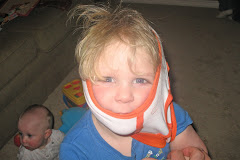
Like many parents I was a bit nervous about all of this. Not because I didn't want to talk about it but because I didn't know how much to talk about. I didn't want to freak them out. (Maddy), or give them any ideas (Blake).
So, after much consideration we've decided to let pop culture do the teaching.
Fine. We'll just let their friends do it then.
How about their teachers? Well, it turns out that is an option. I do agree that to learn about it somewhere regulated is better than from Fergie, Snoop Dog, and kid-in-my-class (who learned everything from his teenage brother, who in turn learned everything he knows from MTV). So, if school class is the only place they get The Talk then I would concede that it is better than nothing.
We chose to opt out of the school chat and handle things at home instead. Why? 'Cuz it's fun to talk about.
Here are a couple of other reasons:
1) One-on-one is more better.
Group forum challenges:
- Different knowledge/maturity levels/learning methods of the kids.
- Group environment doesn't encourage open dialogue or sensitive questions.
- Inability to read each child's comfort level, interest, understanding as information is given
- The larger the group of kids, the lower the collective maturity = Not good for this discussion
2) I want to be there when The Talk happens. That way I can determine the tone, forum, and refreshments and make sure they jive with my own values and parenting style. Plus it tells the kids it's important enough of a topic that I am handling it myself. Of course, I may botch things up horribly but they are used to that by now.
3) The Event vs. A Series of (Unfortunate?) Events.
I remember my dad sitting me down when I was around 7 or 8 and having the Talk. All I remember is thinking, "Dad, I am way ahead you here." Not his fault but I just happened to have learned it by then. That was it. One talk. So I thought I'd take a multiple session, a little-at-a-time approach starting a little sooner. This seems to have worked pretty well for the following reasons:
- It is driven by the child and not by the parent. The first time I spoke with Blake, I thought I'd cover what I deemed "the basics". Well, after going over just a few things I felt prompted to stop, so I did. Since then we've gone into more depth on a couple of other occasions. These sessions went much better. Natural. He was interested and it brought us closer as father and son. I actually look forward to these talks now.
- Multiple discussions make it less formal and a natural part of a normal American kid's life. Like math. Or soccer. Or Socialism. This allows them to feel that intimacy is also natural and comfortable. Not something to fear or to avoid discussing, but something to respect, to prepare for, and to look forward to some day - like when they are 40.
Finally, in David Letterman style here is my Top 5 advantages for sex education at home:
5) Now they can watch Rated R movies and understand all the bad stuff. Research.
4) I don't have to skip all the bad songs in my iTunes library anymore when they're in the car. Research.
3) They can be kid-in-my-class-at-school with all the answers.
2) Maybe this will give Blake some ideas for his Science Project.
1) It's fun to talk about.
One last note: It could be worse. I noticed when reading a bit about school sponsored sex education programs, schools in Germany require 20-30 hours of sex ed per year as part of their core curicullum.
What in the world do they talk about?
Maybe they use flip charts and let the kids color anatomy pictures to pass the time. Or play that Operation game...
Wait, isn't Dr. Ruth from Germany? No wonder she knows so much.
The end.
















